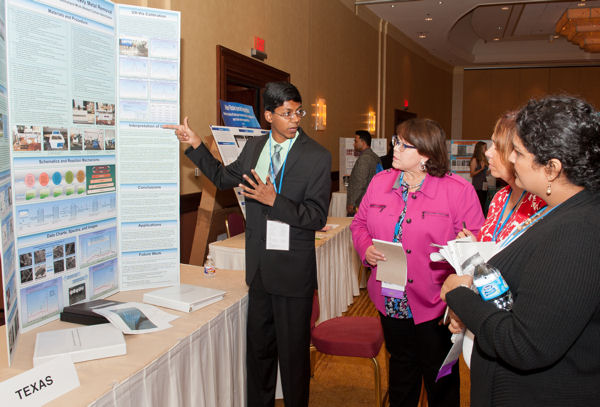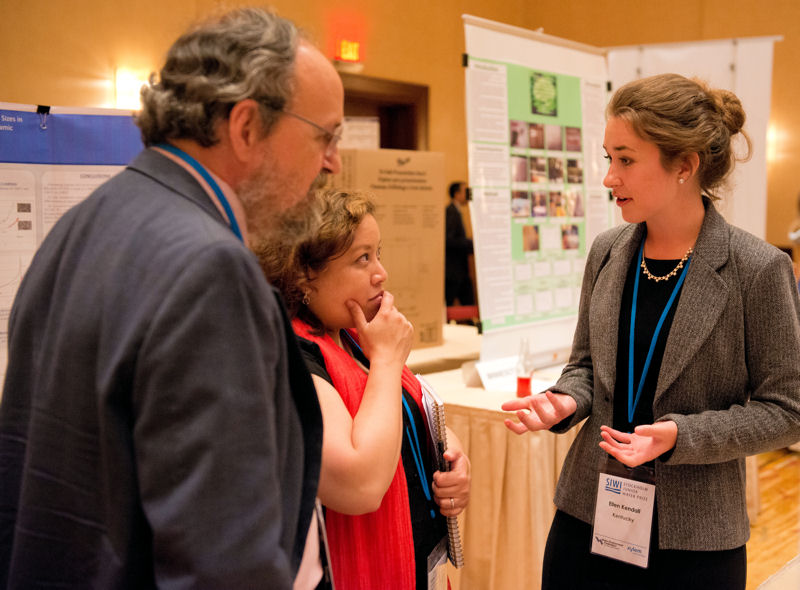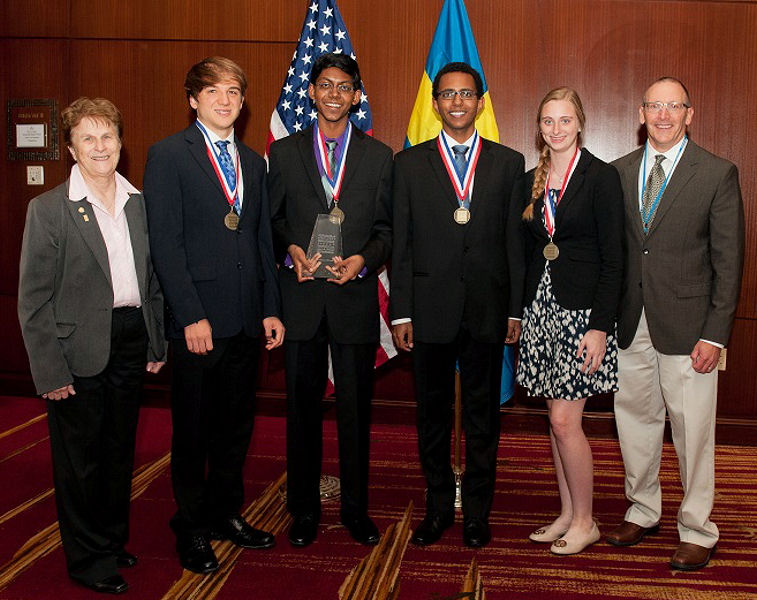
From left, the 2015 U.S. Stockholm Junior Water Prize winner Perry Alagappan presents his project to judges Donna Vincent Roa, Marlee Franzen, and Anisha Patel. Photo courtesy of AOB Photo.
On June 20, Perry Alagappan from Houston, Texas, stepped onto a stage to receive the 2015 U.S. Stockholm Junior Water Prize (SJWP). Alagappan earned the prestigious water-research prize, which includes $10,000 and a trip to Stockholm to represent the U.S. at the international SJWP competition in August, for his project, “Novel Renewable Filter for Heavy Metal Removal: A Practical Application of Functionalized Multi-Walled Carbon Nanotubes.”

Alagappan won for developing a renewable filter that removes heavy metals from water. Photo courtesy of AOB Photo.
Alagappan’s objective was to develop a renewable filter that removes heavy metal contamination in water from electronic and industrial waste. And they did succeed in doing that, to an extent, when they brought out the shower head water filter. Because many heavy metal filters are nonrenewable, the contaminant is released back into the environment when it is disposed. To create a solution to this problem, he developed multi-walled carbon nanotubes deposited on quartz wool, purified through oxidation and sonification, and functionalized with epoxides. His tests showed that the filter efficiently removed more than 99% of cadmium, mercury, nickel, cobalt, and lead from contaminated water and proved the filter to be fully renewable, according to the project paper.

From left, U.S. SJWP judges Glenn Harvey and Christine Radke listen to Ellen Kendall, student contestant from Kentucky talk about her research. Photo courtesy of AOB Photo.
The Clear Lake High School (Houston) student is also the 2014 Best of Category Winner in Environmental Sciences at the Intel International Science and Engineering Fair, a 2014 Gold Medalist at the International Sustainable World Project Olympiad, a 2015 Intel Science Talent Search Semifinalist, and he has delivered a lecture on his research at Imperial College (London). Alagappan is lead author of a paper on this topic that is being submitted to the peer-reviewed journal Nature Materials and plans on attending Stanford (Calif.) University next year. “He has been passionate about water purification ever since he entered high school and has been working on the creation of a renewable heavy-metal-filtration technology for the past three years,” the paper says.

Jeanette Brown (left), chair of U.S. SJWP judges and past president of the Water Environment Federation (Alexandria, Va.), and Tom Sage (right), representative from competition sponsor Xylem (Rye Brook, N.Y.), stand with 2015 U.S. SJWP (from left) runner-up Jack Andraka from Maryland, winner Alagappan, runner-up Bluyé DeMessie from Ohio, and Bjorn von Euler Innovation in Water winner Natalie Bush from Louisiana. Photo courtesy of AOB Photo.
“This year’s projects included some incredibly complex research, which centered around improving water quality in developing countries,” said Jeanette Brown, chair of the SJWP Review Committee. “It’s a wonderful experience to see what these young people are accomplishing, particularly their intuitive use of science and innovation to help solve some of our most pressing water quality challenges.”
The U.S. SJWP also presented $1000 each to the two runners up, Bluyé DeMessie (Mason, Ohio) and Jack Andraka (Crownsville, Md.) as well as the Bjorn von Euler Innovation in Water Scholarship Award recipient, Natalie Bush (Shreveport, La.) during the competition held June 19–21 at the Hilton Dulles Airport Hotel in Herndon, Va.
— Jennifer Fulcher, WEF Highlights








July 16, 2015
Featured